Does ‘Strong Female Character’ Mean Girl Kicks Guy in the Face?
Today’s media produces entertainment featuring strong female characters.1 However, in depicting such characters, there is an over-emphasis of physical strength. Is this the only way to show feminine prowess?
In Star Trek: Voyager, B’Elanna Torres is a human/Klingon hybrid. She is known for her volatile temper, her strength, and her aggression. In the episode entitled “Living Witness”, the Doctor in reminiscence, makes this comment: “B’Elanna Torres. Intelligent, beautiful and with a chip on her shoulder the size of the Horsehead Nebula. She also had a kind of vulnerability that made her quite endearing.”
Let me state here: I’m glad more women are being seen in roles of strength. There are more diverse stories, interesting conundrums to ponder through, etc. Wonder Woman can flip over cars, deflect bullets, and keep her hair from getting dusty while debris is flying all over the place. Captain Marvel can take a punch by Thanos. Heck, I once got hit in the face by a baby and got a black eye.
The women are kicking butt just as hard as men…which I think it part of the fascination and the problem. These characters, along with others, focus on physical strength. There is an over-emphasis on physical strength as the deciding factor of strong female characters.
Ultimately, I believe it comes down to this question: Does having a strong female character simply mean having a girl kick guy in face or is there more to her than just physical strength?
Let’s explore some iconic and well-known fictional female characters. This list doesn’t pretend to be exhaustive by any means. I know I could have chosen dozens, perhaps hundreds more.
But then Speculative Faith would probably send me a reminder that brevity is an unacknowledged fruit of the Spirit. ?
Chun Li, Streetfighter Game Franchise
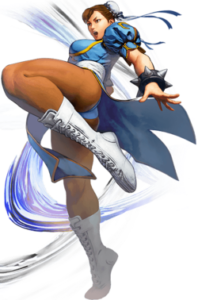
Chun Li. Image copyright: Capcom.
When I think of a strong female character that fits the ‘girl kicks guy in face’ like a glove to a hand, I think of Chun Li. According to trusty Wikipedia: “While she isn’t the first playable female fighter, she is the first playable female fighter of any fighting game franchise to gain mainstream recognition…”
Within the context of this character, there is still remnants of a softer femininity that the game creators kept. After she wins a round, she does this cute little laugh and jumps up and down like a young girl while the poor warrior is wallowing in his blood.
Weaker sex, my big toe!
Of interest is Chun Li’s backstory. She trying to take Bison, the man who killed her father. Her motivation remains the same throughout most of the incarnations and reincarnations of the game and the films. However, after she defeats Bison, she says something to the effect of she’s going back to being an ordinary girl. In this context, she was already trained in various martial arts but it was for a specific purpose. Physical strength was not her for all and be all of existence.
Okoye, General of the Dora Milaje in the Black Panther Universe and the fictional African country of Wakanda.
Since I’m not a comic book fan I can only discuss her portrayal in the movie.
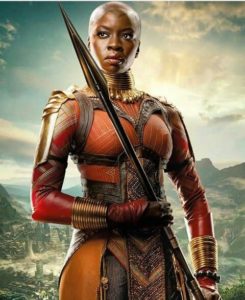
Okoye. Image copyright: Marvel Studios
This character can kick a guy in the face. And stab him while he’s still recovering from the blow. Her physical strength is what made her an asset to King T’Challa.
Yet it is her sense of duty that really struck me as a core element of feminine strength. Duty and honor go hand in hand. Okoye’s duty lies to the king of Wakanda even at the cost of her own desires. This is made evident when Kilmonger usurps the throne. Believing that King T’Challa is dead, despite her feelings, she gives her allegiance to the new king.
When it’s discovered that King T’Challa is still alive, which still makes him the king to serve, she does so by fighting against Kilmonger. Though her strength is an asset, it is duty and honor that makes her strong.
The Mistress of Storytelling – Scheherazade
Far as I know, Scheherazade wasn’t strong in the physical sense. Most of the tales she told the anthology were tales from antiquity.

Scheherazade by Sophie Gengembre Anderson – Public Domain
According to the English translation of Arabian nights, she is described as: “Scheherazade had perused the books, annals, and legends of preceding Kings, and the stories, examples, and instances of bygone men and things; indeed it was said that she had collected a thousand books of histories relating to antique races and departed rulers. She had perused the works of the poets and knew them by heart; she had studied philosophy and the sciences, arts, and accomplishments; and she was pleasant and polite, wise and witty, well read and well bred.”
Imagination and creativity was her strong suit. She saved her life by telling bedtime stories. Stories are the universal language of the planet. It builds bridges, and cements relationships. When we share in story, as Scheherazade did, we share in the human experience.
Sarah Connor – The Terminator Franchise
Sarah Connor’s character grows as she works to give her son every advantage to fight against the machines destined to take over the world. In Terminator 1, she’s just flimsy thing, very soft and just a regular girl.

Sarah Connor. Image copyright: TriStar Pictures
Now, in Terminator 2, she becomes this hardened and cynical warrior. If you notice, her appearance has changed drastically, bearing more muscles and leanness, erasing the softer part of her character. Now, we do know her story arc. She’s doing everything she can to prevent Judgement Day. There’s a scene in the movie where she must decide between killing an innocent who may be guilty one day or not. It’s an interesting scene because she comes to the realization that she’s doing the exact same thing the murderous terminators from the future are doing – taking care of a problem before it becomes one.
At the end, it’s not her physical strength that takes precedence but the compassion for another human being that makes her strong enough to NOT kill the person.
Dana Scully, The X-Files
It would be remiss of me to not mention everyone’s favorite female skeptic, Dana Scully. Throwing aside all tropes about green-eyed redheads being temperamental and emotional, she took the stand as level-headed woman, only interested in what science could tell her.
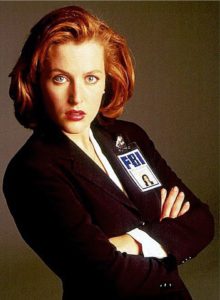
Dana Scully. Image copyright: Fox Television.
This shows a characteristic of feminine strength is of logic and reason. Women are cerebral to the extreme. Generally speaking, women talk. Contrary to popular belief, they talk over things not always because it is an emotional outlet though it can certainly be that. I’ll be the first to admit that. Sometimes, we’re working out a problem.
A woman may not want a solution at that moment but while she’s talking it out, she is expressing a lot of things about whatever is on her mind. Is this not what analytical fields do – explore a variety of avenues until they come up a solution?
Ellen Ripley, the Alien Franchise
Sacrifice is another aspect of feminine strength. The female character that comes to mind is Ellen Ripley of the Alien franchise.
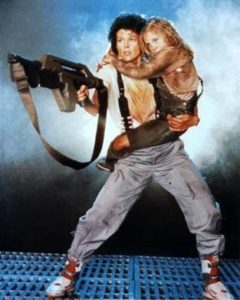
Ellen Ripley. Image copyright, 20th Century Fox.
Ellen Ripley sacrificed being with her daughter, in the first movie, to provide a better life for her. This action leads to an event that changes her life forever. Encounter with an abandoned ship which leads us down the path of meeting a murderous alien species who uses us as incubators for their young.
In Aliens, the second movie of the franchise, there’s a marvelous battle between Ripley and the Alien Queen. It’s probably the best cat fight ever.
Allow me to wax on about the scene from Aliens. These are two females showing the fierceness of the gender in a maternal role. Both are females protecting their young – communicating their intentions and willing to go head to head to protect them…or avenge them!
I’m sure there are more characters I can pull from popular culture from all over the world that would depict women as strong characters bereft of physical strength.
It brings me to my conclusion as I parallel this to the Bible and what woman personifies what a strong woman is.
Proverbs 31 is a message from a woman to her son. It’s well known in all of Christendom. The verse 10-31 are often cited as The Virtuous Woman. In these few verses, we gain insight to a woman who is an entrepreneur, a housewife, mother, lover, a safe place, and a blessing. She’s not subservient, not chattel, not a second-class citizen, not an afterthought. She is front and center. She is a strong female.
The person who I can best see who embodies all the aspects of the virtuous woman is you, my sister in Christ. It is He who lives in you that makes you strong. All these fictional female characters must rely on themselves. We, virtuous women, we don’t have to rely on ourselves.
Our sense of duty and honor, our compassion, our reasoning, everything is based in Him. He is what makes us strong and all others are poor imitations.
What attributes did I leave out? What fictional female characters can you think of? I kept it in the speculative fiction arena but I know there’s more? What are your thoughts?
- Travis Perry here for just a second. I’m yielding my regular Thursday slot to Parker J. Cole this week. ↩





















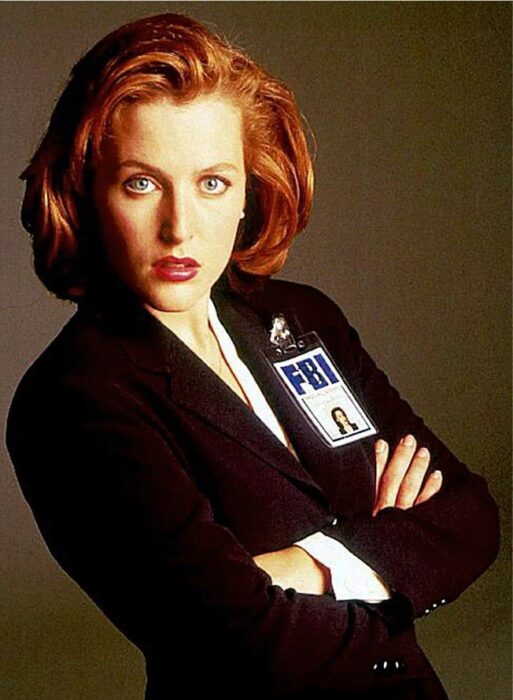







The female MC of my wife’s as yet uncompleted book Silence. Her name is Tacey which means silence. Her newlywed husband loses his memory and a coniving upstart tries to convince him that she is his wife. Does Tacey fight her for the man she loves? No. God tells her to be silent. In spite of circumstances that scream “Do Something!” Tacey is silent and waits on God. That is strength.
I love that response, Larry. I wish I knew when to be quiet sometimes! Waiting on the Lord is hard.
The thing is, silence is touted as a virtue mostly for people lower on the status scale.
It’s a great virtue for women to be silent, but not so much for men, unless the perceived status difference is too different (like black men and the police). Children are supposed to be silent. Poor people are supposed to be silent about their disadvantages and sufferings unless they jump through juuuust the right hoops for condescending private charity, and then they are supposed to be grateful and shut up again. Immigrants are supposed to be grateful and shut up about any possible improvements to the system.
Would your wife’s story be the same if it were a man who’s expected to be silent in the face of his amnesia’d wife being taken advantage of? I doubt it. What kind of loser beta male would he be perceived as? Whereas women are expected to shut up about any kind of feelings that are inconvenient to larger group. At least nowadays your wife’s story is weird enough to garner attention, because, really, who does Tacey’s silence benefit, anyway?
That’s a good question in general, anyway. Who does the silence benefit?
I can see your point of view but I don’t Larry was coming from that angle as much as waiting on the Lord to move in a situation instead of jumping willy nilly. That’s what I got from it anyway.
That’s the thing, though.
This story is not being creating in a vacuum, and it’s not being read in a vacuum. So even if that’s not what the story is meant to do and say, that’s the narrative he’s reinforcing with this comment, if not with this book.
The ability to keep one’s mouth shut is a virtue for anyone, no matter how powerful. Note “ability to” doesn’t equal actually keeping one’s mouth shut in all cases. I have actually held my peace a time or two, believe it or not. And certainly have wished on many occasions that Donald John Trump knew how to shut his mouth.
So the “silence is a virtue for the weak” thing just ain’t true.
Not exclusively, but it’s deffo a tool of manipulation often wrapped up in virtuous frills.
I think Larry’s wife’s story would have more meaning insofar as challenging tropes go if it WAS a man who had to stay silent for his wife’s sake. There are a lot more taboos against a man being passive than a woman being passive.
I saw a tumblr screenshot where they talked about most dumb action movies with “strong female characters” are mostly just the same toxic-masculine tropes with boobs slapped on for fanservice. It’s not wrong.
Thanks for the response. I feel as if by simply focusing on the physical strength and not other qualities of what makes women strong, we, in fact, turn women into men.
I’ve long thought it rather unfortunate that the definition of ‘strength’ so often devolves into just physical strength, for both men and women in pop culture. It doesn’t just turn women into men, but it diminishes men as well.
TBH, I don’t even know what “turn women into men” is even supposed to mean (if it doesn’t mean sexist crap).
My first thought with this is – a lot of the problems that people talk about with “strong female character” tropes come from “male gaze” filmmaking. Even female filmmakers who’ve been taught to frame and tell stories through the male gaze do it too.
I recently watched “Unbelievable” on Netflix, and OH WOW, I felt the difference there. I’d say that show was a really good example of female gaze, and it felt so refreshing.
I liked Sara Connor quite a bit, at least in the second movie. She was pretty cool, and within the context of the Terminator story world she felt believable and three dimensional.
With strong female characters, having a reasonable amount of variety is pretty important. In Fate Zero, for instance, we have Arthur(also called Arturia, or Saber, if you want to go based on her classification), Irisviel, and Natalia. Arthur was very young and idealistic, but also very powerful due to her magic. She was also a king, and an inspirational figure that did everything she could to save her homeland from invaders. But she was still very tragic and had to struggle throughout the story, because she discovered many harmful mistakes she made in the past. She constantly came up against people that criticized her deepest convictions and her desire to protect what was dearest to her. Part of it was that she was so young, and some people pitied the fact that she bore such huge burdens at a young age instead of just being able to live her life.
Irisviel is interesting, because at first she could just be seen as the loving, dutiful wife, but as the story goes on she’s obviously way more complex than that. She actually has lots of doubts and doesn’t feel entirely attached to her husband’s ideals, but follows his plans for her own reasons(partly because she believes they will make a better life for their daughter) She knows how to fight, even if she doesn’t have a lot of real world experience in that. She likes fast cars and learned to drive pretty well(if a bit recklessly), and in spite of how much she loves her husband, she had a moment where she got kinda irritated with him and told him to do something.
Natalia was an awesome assassin. She only got about two episodes worth of screen time, but there was a lot of depth and strength to her even in that amount of time. She mentored Kiritsugu, the main character, and considering how skilled Kiritsugu was, it shows that Natalia was very skilled as well. She comes off as cold at first, but we see later how much she cared about Kiritsugu, regarded him as a son and wished she could give him a better life. In some ways, she wasn’t the best role model, but she obviously did her very best, and somehow doing her best in spite of not being entirely suited to raising someone makes her story all the more powerful.
These three women are very different, but still strong in some way or another. It’s a pretty important consideration. Like, sometimes people feel like everyone from a certain group needs to be the same(women in this case) But in reality it’s often better to show people as distinct individuals, even if they come from the same cultural background or something. These three chars had completely different backstories, in fact, so expecting them to have similar mindsets and struggles would be ridiculous.
Ok, going to make another post that’s sort of a reply to notleia’s comment about silence as a virtue being used to oppress people, but also just a comment on the issue in general.
Yes, of course people in authority can use ‘virtuous silence’ to quiet people of ‘lower status’. That’s one reason why I dislike censorship, regardless of who that censorship comes from. There are certain time, place and manner issues that need to be applied when it comes to where stories are published, but that shouldn’t translate into completely banning books or whatever.
But it’s wrong to just assume that criticism or virtuous silence is usually a matter of oppression. Now days, that assumption can make it hard to have legitimate discussions about the faults of someone that happens to be in a minority group. Or, those discussions are only ‘allowed’ to come from someone of the exact same group. And that does very little for equality because it only forces divisions between groups, instead of people treating each other as individuals.
I’ve heard of people that want to ban certain words, like ‘bossy’, because they think that word (along with others) are just used to silence women that try to stand up for themselves or progress their careers. That certainly may be the case at times, but that’s a ridiculous reason to ban words. What if I, a woman, want to use the word bossy to describe a man that’s…well, being bossy? What if the person being bossy to me was actually a woman instead? Sometimes people legitimately ARE bossy and should improve their behavior, regardless of their gender.
To give an example, my parents always encouraged me to learn and grow, and wanted me to have leadership skills. One time my mom actually scolded me a bit for NOT taking a leadership role in a group project when she thought I should have. But, my parents ALSO wanted me to be a good person that was reasonably considerate to others. Now and then I actually can get too pushy or even bossy, and that’s something I’ve had to work on.
As such, my parents have had to call me out when I was being too bossy. The time I remember the most was when I was a little kid attending a family reunion. There was a campfire, and all our relatives were hanging out nearby. There were lots of mosquitoes too, which I didn’t like, so I tried staying close to the fire in hopes that it would deter the mosquitoes. But I also noticed that when some of the nearby tufts of grass were thrown into the fire, they sent up little plumes of smoke, which looked cool, and little kid me thought the excess smoke would deter the mosquitoes even more. So I got my little sister and some of my cousins to bring me more tufts of dried grass we could throw into the fire. They seemed ok with it, though it’s hard to say for sure when I couldn’t see their expressions. One of my cousins is like two days older than me, though, so it probably wasn’t great that I was basically ordering around someone that was my age.(Not that it was great for me to boss my younger cousins around either. It wasn’t like we NEEDED to throw dry grass in the campfire.)
Anyway, my parents called me over, and I don’t remember what words they used, but they basically let me know that I was being too bossy and should stop. After they mentioned that, I reflected on my behavior and realized that I probably did look bossy. I definitely didn’t mean to, but even though I care greatly about how I come across, I don’t always notice the way my behavior looks until I get some sort of feedback. Sometimes that’s hard for me, because I might actually be doing nothing wrong and people are simply misinterpreting my intentions. But this instance with the campfire was actually a good one for me to get called out on. It didn’t upset me that much, and it definitely didn’t make me feel like I was supposed to shut up and let the men talk. Growing up, I basically learned that everyone should be competent enough to handle the situations they’re in, and know how to apply those skills in a leadership situation, but that should NOT translate into needlessly being a jerk to others. It’s hard to take a leader seriously if they’re too pushy to listen to others, or freak out the minute someone insults them.
And that plays heavily into the silence as a virtue thing. It’s bad when someone is expected to stay silent simply due to status. But it’s ridiculous to assume that’s what’s happening whenever silence is applauded or criticism is meted out. If we want women to become good leaders, they need to be taught how to handle criticism correctly. Instead of assuming everyone’s against them just because they’re female, they should examine their behavior, see if there’s anything that can be improved, then move on.
Silence is a good thing when used with discretion. Everyone, regardless of gender, needs to learn what to say and when. That can vary per individual and situation, but that doesn’t make it less important. Some of the women that have an easier time gaining success have personality types that can be extremely difficult to deal with. Discretion is one of the most important things for them to learn, because unfortunately the flaws these personality types have are some of the easiest to spot and hardest to understand.
So, for example, my dad and I have the same personality type, and although we’ve had different life experiences, somewhat different outlooks, etc, we have the same underlying psychology. Sometimes it’s downright uncanny how similar we are in terms of the conclusions we come to, or the problem solving skills and argument styles we naturally use. Gender is extremely irrelevant here. We’ve both had areas we’ve deserved criticism in, and lessons we’ve had to learn. And if our personality type doesn’t learn those lessons, it can become toxic.
And then there’s people with Trump’s personality type. Unfortunately, although they can accomplish a lot in life, they can be difficult people. Trump would definitely do a lot better if he learned when to be quiet, or what to say in the first place. There’s women with that same personality type, though. Yes, they’re kinda rare, but they can suffer from many of the same problems if they aren’t taught right growing up. How to teach kids discretion and healthy leadership skills is another topic on its own, but it’s harder to teach those lessons when people freak out any time a woman is asked to hold back or show discretion.
Furthermore, a lot of the people that try to speak out on behalf of women and minorities do a bad job of it. So it’s not always true that people are trying to silence minorities. Sometimes it’s more like the people speaking out aren’t articulating themselves well, or are exhibiting hypocritical and toxic behaviors that actually do need to be called out. Here’s a small example:
Maybe the guy Tess Fowler was criticizing is the scum of the earth. I don’t know. But as the youtuber points out, it was kind of ridiculous for Tess to post an accusatory rant, only to come back along and say it was just a ‘mild critique’. Regardless of whether Tess’s rant was right or wrong, it didn’t seem to say anything except that she thought the guy in question was horrible and deserves bad things. She already jumped angrily into the situation with all fairness thrown to the wind. Of course people are going to respond in defensive and angry ways. She’s not opening up a legitimate conversation discussing what a minority goes through, she just verbally hammered anyone that disagrees with her.
I actually respect people a lot more when they’re like the youtuber in the video I just linked. She seems to be more on the liberal side of things, so I don’t agree with her on nearly everything. But I really appreciate how she articulates herself in a calm, fair, pragmatic manner. In real life there’s probably times when she doesn’t, but at the very least she seems capable of genuine respect for others almost regardless of their beliefs. Even when she criticizes someone, she doesn’t seem obsessed with destroying them. She doesn’t look very afraid of sharing her own opinion, but also realizes it’s not the end of the world every time someone disagrees. We need a lot more of that if we’re ever truly going to fix society’s issues.
As for the book Larry’s wife is writing…it’s not fair to whine about women not having a voice while also acting like she’s not allowed to write certain things. Like, yeah, it’s fine to disagree with what she’s writing and it could be interesting to discuss the pros and cons of presenting certain topics. But just because the story would be ‘more compelling’ if it was a guy having to stay silent doesn’t mean that’s the story Larry’s wife ‘should’ be writing. Some girls don’t enjoy writing guy chars and vice versa. Back when I used to roleplay, there were several times when I had to play all or most of the guy chars simply because I was rping with someone that was only good at writing girls.
Sometimes authors have deeply personal reasons for choosing what gender a certain character is. A female author might identify more with female characters. She may also have some personal struggles and lessons she wants to discuss through the main character, and thus making that character a female will feel like the obvious choice.
I personally love writing both male and female characters, and usually it’s better when authors can write both genders well, but that doesn’t mean someone should be looked down on just because they choose to write one or the other. And like…look, people talk all about straight white men being the ones to silence people’s voices, but in reality some of our modern SJWs do a lot more to silence voices. I do my best to write stories from multiple perspectives(even ones that completely disagree with mine in some cases). But I’m not really intimidated by white men. I’m more concerned about radical SJW twitter mobs and the like who talk about diversity but only accept things that are presented in terms that reflect their extremely narrow view of the world.
O ye of little faith in my capacity to bitch about people of any and all genders 😛
Well, I know you can, even if it doesn’t look like it since you rarely do. Like I said, some of this was also a commentary on the issue in general.
I would expect that any SJW actually can complain about women or minorities or whatever, but part of the problem is the whens and hows and whys. Someone from a minority can speak out with their opinion, but the more rabid SJWs might freak out and start a twitter mob if that opinion doesn’t fit their particular strain of wokeness. Criticism and debate is fine, but some people seem to think it’s good to go way past that over the smallest things.
There was this comic book character back in the 90s named Rocket partner to Icon. She was also a teen mom. What I enjoyed about Rocket is she decided to keep the baby instead of doing abortion she took the responsibility to keep the child. She’s also a writer who is inspired by Toni Morrison. She is a unique character and I believe she’s a great female character that others should check out. Her and Iron Butterfly are among my favorites